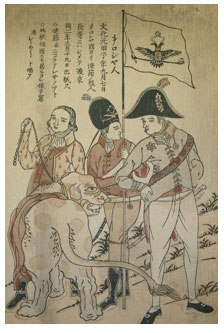
Images and Openings of Japan: An Exploration of some Major Themes and Myths in Japanese International History from Kamikaze and Kurofune, to Sakoku and Rangaku
21 March 2011, London
 Throughout its history Japan has been imagined and experienced by others in both remarkably different and broadly similar ways. These changing images and ideas of Japan have in turn influenced the motives and actions of others toward Japan, as well as the behavior of the Japanese themselves. This lecture will first focus on the opening of Japanese ports to Western ships in the years from 1853-1855 and on the historical background to it. This opening heralded the beginning of our modern era of globalization and its significance will be reinterpreted in the light of insights gained from the most recent scholarship. The considerable disparity in knowledge and perception of the relative roles of the principal actors in this historical drama among Westerners and Japanese that exists even today underlines the importance of point of view in history. The myth-making process began early and continues today as some of the major myths and metaphors surrounding it are recycled as tourist attractions and political slogans.
Throughout its history Japan has been imagined and experienced by others in both remarkably different and broadly similar ways. These changing images and ideas of Japan have in turn influenced the motives and actions of others toward Japan, as well as the behavior of the Japanese themselves. This lecture will first focus on the opening of Japanese ports to Western ships in the years from 1853-1855 and on the historical background to it. This opening heralded the beginning of our modern era of globalization and its significance will be reinterpreted in the light of insights gained from the most recent scholarship. The considerable disparity in knowledge and perception of the relative roles of the principal actors in this historical drama among Westerners and Japanese that exists even today underlines the importance of point of view in history. The myth-making process began early and continues today as some of the major myths and metaphors surrounding it are recycled as tourist attractions and political slogans.
In reexamining the “opening of Japan” can any universal features or historical parallels be found that would apply to our present world situation? What are the different dimensions that should be considered in attempting to judge the relative degree of openness or internationalization of Japan today compared to other countries? Finally, what contribution can Japan make to world culture and what policies should it pursue to achieve that goal? Some possible answers to these and other questions will be suggested in this talk.
William McOmie is Professor in the Faculty of Foreign Languages at Kanagawa University in Yokohama, where he teaches Comparative Culture and American/British studies. A graduate of the University of California at Santa Cruz and at Davis, where he combined study of science and humanities, including foreign language, literature, and history, he subsequently travelled and lived abroad, eventually settling in Japan. In 2001-2, he held a visiting scholar position at the Center for Japanese Studies at the University of California, Berkeley. For more than a decade, he has been accessing primary sources in English, Russian, German, Dutch and Japanese for his research. Among his many publications, The Opening of Japan, 1853-55: A comparative study of the American, British and Russian campaigns to force the Tokugawa shogunate to conclude treaties and open ports to their ships (Global Oriental, 2006), was reviewed by Sir Hugh Cortazzi in The Japan Times and declared ‘essential reading for all students of the history of Japan’s foreign relations.’ His current research focuses on Western ideas and experiences of Japan in the bakumatsu and Meiji periods.
To reserve your place, please call the Japan Society office on 020 7828 6330 or email events@japansociety.org.uk
A Japan Society review of William McOmie’s book “The Opening of Japan 1853-1855: A Comprehensive Study of the American, British, Dutch and Russian Naval Expeditions to Compel the Tokugawa Shogunate to Conclude Treaties and Open Ports to Their Ships” is available to read here.
A pay bar is available before the lecture
(Please note that Oriental Club rules require gentlemen to wear a jacket and tie)
24 March 2011 |
 |
|
The Garden Room, The Oriental Club, Stratford House, 11 Stratford Place, London W1C 1ES |
||
Tel:020 7828 6330 |
||
The Japan Society |
||
